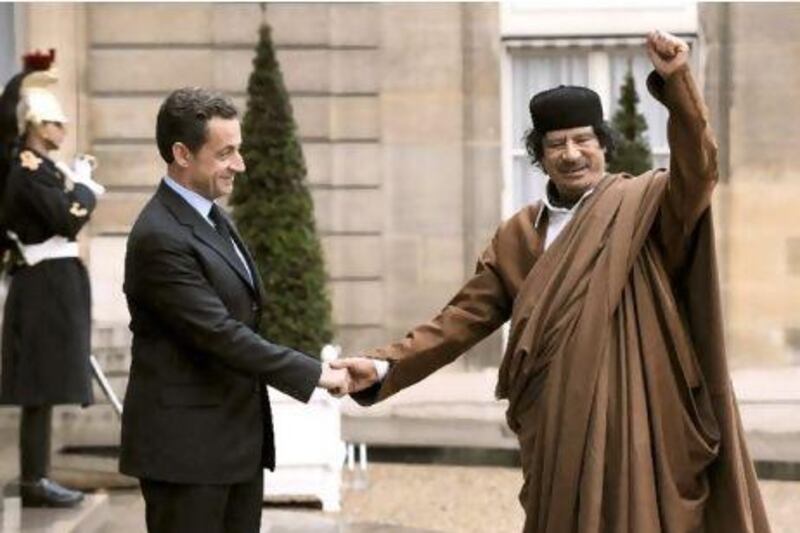MARSEILLES // If Nicolas Sarkozy thought France's central role in the UN-backed intervention in Libya would strengthen his flagging prospects of winning a second term as French president, the voters are sending him a harsh message.
Regional elections have confirmed the growing impact of Marine Le Pen, the new darling of the far right. Her rising popularity is of deep concern to all involved in mainstream politics, but especially to its main casualty: Mr Sarkozy's centre-right UMP.
Mr Sarkozy's political troops are in disarray, torn apart by infighting just as they face an uphill battle to outwit Ms Le Pen and ward off an increasingly buoyant socialist opposition. The president's standing, weakened by poor economic performance and allegations of corruption within government, seemed to enjoy a minor boost when French diplomacy led the world in supporting anti-Qaddafi rebels in Libya.
But the French recall that the Libyan president was feted on a visit to France in 2007. Warm handshakes were exchanged on the steps of the Elysée and valuable contracts were signed.
Although only Mr Sarkozy's sternest critics would accuse him of pressing for military action for political reasons, any domestic benefit from his high-profile performance on the world stage has been short-lived.
Furthermore, the president's robust support for the Libyan opposition came after what was seen as his government's dismal initial response to revolts in Egypt and especially Tunisia.
His foreign minister, Michèle Alliot-Marie, previously seen as efficient and dependable, was forced to resign over disclosures about her links with the entourage of Tunisia's former president, Zine el Abidine Ben Ali. Opponents also criticised her for offering Mr Ben Ali French "know-how" to combat demonstrators.
Mr Sarkozy risks being further damaged next week when his party holds a debate on the secular state, which many see as a debate on Islam's place in France.
A new body representing all French religious faiths - including the two biggest, Roman Catholicism and Islam - has added its voice to the criticism that the debate could stigmatise France's Muslim population.
For many opponents of the debate, to be held on Tuesday, it is not only badly timed in view of the violence in the Middle East and North Africa. By appearing to target Islam, they feel, it also amounts to a gift for Ms Le Pen's Front National (FN). Six days later, a legal ban on face-covering veils in public places takes effect.
The fear for the dwindling army of Mr Sarkozy's faithful is not so much that he will be ousted by the socialists in 2012, but that he will not even reach a decisive second round.
A number of polls suggest he would be eliminated by Ms Le Pen in the first round, leaving the Left to mobilise a "republican front" against anti-immigration, France-for-the-French nationalism in the run-off.
One of the latest polls gave Mr Sarkozy only 17 per cent of the vote, with 21 per cent going to Ms Le Pen and 34 per cent to Dominique Strauss-Kahn, head of the International Monetary Fund and regarded as the socialists' most electable figurehead.
This month's cantonal elections have given Ms Le Pen every reason to hope she is dragging her party clear of the extremist fringe. The FN won less than 12 per cent of the total vote, and only two seats, but averaged 40 per cent wherever it fielded candidates.
There is also the case of abstaining voters. In the second round of the polling, abstention reached 55 per cent; in some cases, more people turned out merely to register their wish not to vote than to support the winning candidate.
What will these people do when the presidential elections take place in April next year and if a second round is necessary in May? Mr Sarkozy knows he has to win back those who would in the past have voted for him but, if they have not defected to the FN, see no incentive to vote at all.
Despite the uneven nature of his foreign relations, it is on national rather than international policy that his hopes for a second term probably depend.
In the current political climate of discontent at his handling of the issues that matter most to the French - immigration, jobs, crime and the power of the euro - the signs are that Mr Sarkozy faces a tough challenge from Marine Le Pen.
"It was not a vote for," said one man who helped one of the FN candidates win a regional seat on Sunday. "It was a vote against."







